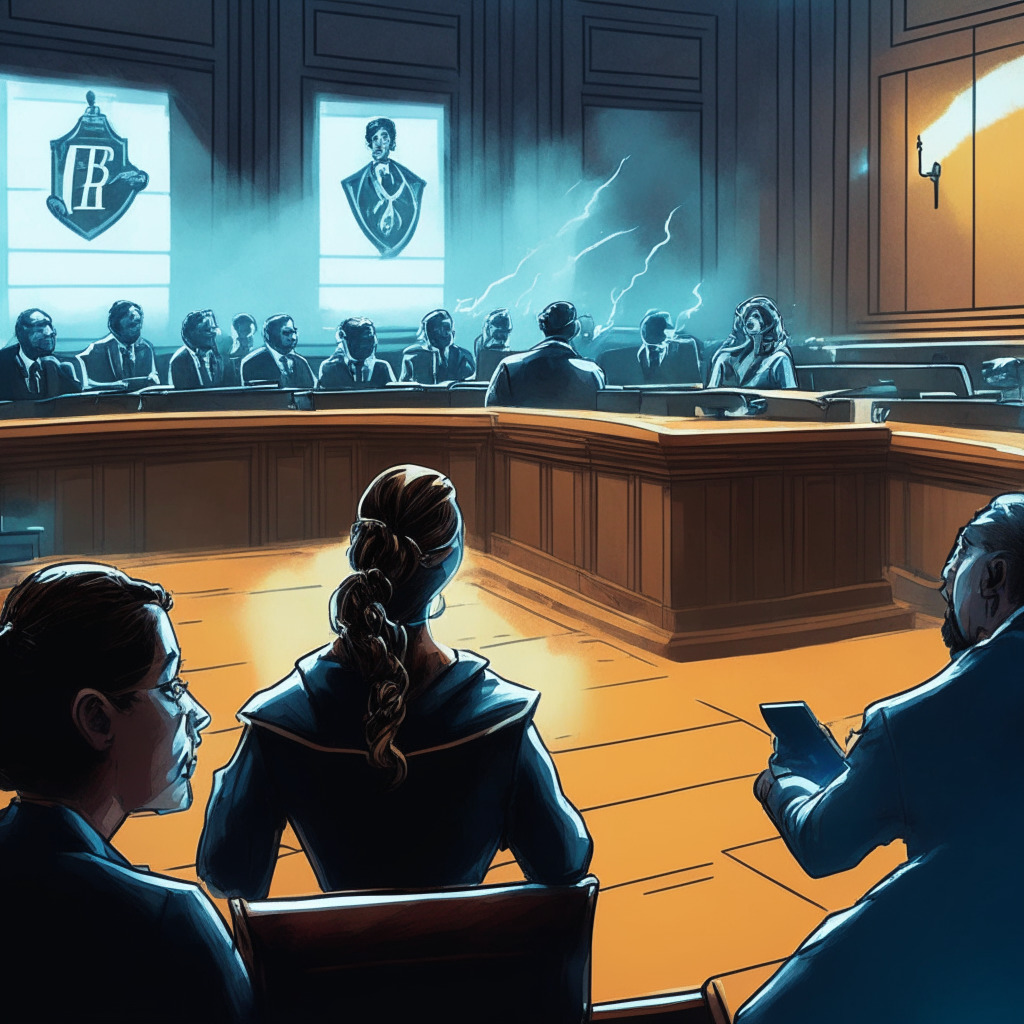The article discusses HBAR’s recent price increase of 10%, largely due to the integration of the Hedera-based platform, Dropp, into FedNow’s service providers. It anticipates a potential further growth, possibly to $0.080, based on HBAR’s robust decentralized network and promising strength index recovery.
Search Results for: FedNow
Hedera Hashgraph’s Explosive Growth Post FedNow Integration and the Potential of Launchpad XYZ
“Hedera Hashgraph rocketed up 20% following the announcement of its FedNow integration. While achieving significant growth through partnerships with giants like Kia, Hyundai, and Microsoft, its formal connection with the Federal Reserve has caused stand-out market surges. However, future seismic price shifts are being eyed in the emerging project, Launchpad XYZ, designed to demystify Web 3.0.”
HBAR Rises as FedNow Integrates Hedera’s Dropp: A Seismic Shift in Blockchain Landscape?
“Hedera Hashgraph’s digital token HBAR sees a value surge following its decentralized applications (dApps) Dropp’s listing by the US Federal Reserve’s payment service, FedNow. Dropp offers an affordable micropayments platform and infrastructure for the trending non-fungible token market, positioning Hedera’s applications on the brink of a significant shift in the blockchain technology landscape.”
Exploring FedNow’s Implications: An Unintentional Preparation for CBDC or a Privacy Nightmare?
“The U.S. Federal Reserve’s FedNow initiative may inadvertently pave the way for the necessary infrastructure required by a potential CBDC (Central Bank Digital Currency) in the U.S. While not a digital token, it creates a platform that could facilitate this. The prospect has raised fresh concerns over potential surveillance and control around a digital dollar.”
FedNow vs Cryptocurrencies: A Leap Towards Centralized Digital Finance or a Threat to Decentralization?
The US Federal Reserve’s new FedNow Service facilitates instant money transfers 24/7, which could be considered a challenge to cryptocurrencies known for similar features. However, cryptocurrencies’ decentralized nature, transparency, and immunity to manipulation or censorship present a stark contrast to traditional finance systems. Concerns arise as some view FedNow as a step towards Central Bank Digital Currency, potentially enabling government control over citizens’ lives.
Unveiling FedNow: Monetary Revolution or Strategic Response to Blockchain?
“The ‘FedNow’ service, launched by the U.S. Federal Reserve, aims to make financial transactions swifter. However, its inception may also signify a move towards a Central Bank Digital Currency (CBDC), potentially merging traditional banking with emerging blockchain technologies.”
Decoding FedNow: U.S Federal Reserve’s Stand on CBDCs and Future of Instant Payment Services
The U.S. Federal Reserve’s new instant payment service, FedNow, set to launch in July 2023, is not associated with central bank digital currencies (CBDCs), but operates within the fiat ecosystem. Despite testing by numerous institutions and growing CBDC interest globally, the Federal Reserve reiterates, it requires legislative authorization before issuing a CBDC.
Stellar’s Ups and Downs: WisdomTree Launch, FedNow Threat and the Rise of Thug Life Token
“Stellar’s XLM experienced a slight dip mirroring the crypto market’s trend. Despite a gloomy weekly decrease, it boasts a 14% monthly and 36% annual increase. The recent launch of the WisdomTree personal finance app, run on Stellar blockchain, is a significant milestone, although overshadowed by potential competition from the Federal Reserve’s instant payment system, FedNow.”
Imminent Ripple Lawsuit Judgement: Impact on Crypto Space and FedNow Launch Connection
The summary judgement in the Ripple lawsuit may be announced soon, amid the SEC’s preference for Ethereum and Ripple partnered banks’ participation in the US Federal Reserve’s FedNow Service launch. Investors should remain vigilant and informed, as regulatory distinctions can impact the crypto market significantly.
FedNow vs Stablecoins: 5 Key Advantages Keeping Decentralized Assets Relevant
Stablecoins maintain relevance despite the launch of FedNow, offering advantages like global accessibility, financial inclusivity, on-chain transactions, affordable cross-border payments, and handling unrestricted transaction sizes, making them essential in the crypto ecosystem.
FedNow and Metal Blockchain Integration: Stablecoins, Privacy, and Financial Future Debated
The Federal Reserve’s upcoming integration with Metal Blockchain has sparked debates on stablecoins, privacy, and financial system plans. Metal Blockchain’s collaboration with instant payment service FedNow aims to enable rapid stablecoin conversions and potentially create interconnected “bank chains” for a secure, oracle-independent blockchain ecosystem.
RFK Jr’s Pro-Crypto Presidential Run: Redefining America’s Financial Future and Political Landscape
Robert F. Kennedy Jr., running as an independent candidate in the upcoming U.S. Presidential Race, is adopting a pro-cryptocurrency stance. Aiming to make America a global hub for cryptocurrency, particularly Bitcoin, Kennedy proposes backing the USD with hard currencies, including Bitcoin. This move could fundamentally transform America’s position in the global crypto landscape and the fate of Bitcoin.
Navigating the Tightrope: Federal Oversight and the Future of Blockchain Technology
Vice Chairman of the Federal Reserve, Michael Barr, in a fintech event, emphasized the need for regulatory oversight in the swift adoption of blockchain technology. He discussed the basic research into Central Bank Digital Currency (CBDC), potential for stablecoin legislation, and the significance of balancing innovation with potential risks.
Journey Towards a US Central Bank Digital Currency: A Rocky Path or a Road to Progress?
The U.S. is still in the “basic research” phase of developing a central bank digital currency (CBDC), according to Federal Reserve Vice Chairman, Michael Barr. He highlighted the importance of gaining backing from legislative bodies, addressing risks posed by stablecoins, and establishing a competent regulatory framework before proceeding with any initiatives.
Navigating the Impacts of Token Unlocks: The Case of SUI and HBAR
“The cryptosphere is witnessing a drop in prices of major coins, especially SUI and HBAR due to an expected increase in circulating supply. This token unlock event – a strategy to alleviate selling pressure from early investors and project team members, could cause market fluctuations. However, these short-term shifts should not disconcert investors as smart strategizing can turn such events into opportunities.”
Blockchain vs Traditional Payments: A Detailed Analysis of Utility, Constraints and Potential
Cross-border payments demonstrate the utility of digital currencies, yet adoption faces challenges like technological issues, competition, and regulatory constraints. Blockchain Officer, Paul Brody, suggests basic fiat payments are faster and cheaper through centralized systems, while blockchain payments can impact speed and cost due to duplication across nodes. Blockchain’s potential may not lie in replacing existing models, but in altering the transaction rules through tokenization and inherent programmability.
Navigating the High Seas of Crypto: Hedera Hashgraph’s Struggles and Sonik Coin’s Ascendance
“Hedera Hashgraph sees mixed market performance amidst growing skepticism despite significant partnerships. Sonik Coin, a promising newcomer, offers a viable route for passive income with its remarkable 4,300% staking APY, seeking stability amidst the turbulent crypto-sea, reminiscent of successful $PEPE, Pepecoin’s trajectory.”
Crypto Community’s Internal Upheavals: Layoffs, Regulatory Confusion, and Billion-dollar Flash Crashes
“The cryptosphere is grappling with fundamental discords and minor tribulations. Beyond technical issues, it deals with the anxieties of those invested in it – its quintessentially human aspect. Amid all this chaos, we long for the simplicity amidst complex strife, mirroring crypto’s ambition to simplify finance while wrestling with its complexities.”
Hedera Hashgraph HBAR: A Micropayment Powerhouse Attracting Market Attention or a Fleeting Trend?
“Hedera Hashgraph’s HBAR token sees over 15% surge following the inclusion of Dropp, a Hedera-based micropayments platform, on the FedNow. HBAR’s unique use of hashgraph consensus permits over 10k transactions every second. Its growth also aligns with a 288% jump in daily active accounts and a notable spike driven by non-fungible tokens (NFTs).”
Crypto Market Gains: Hedera’s Rally, Render’s Rebound, and the Potential of ApeCoin and Presales
“Cryptocurrency market sees minor gains led by altcoins HBAR, with Hedera integration into the US Federal Reserve’s payment service, FedNow, signaling promising trajectory, and RNDR token. Interest also looms over ApeCoin’s potential rally. Crypto presales emerge as a promising, yet high-risk, investment avenue.”
Unlocking the Sandbox: Tensions Between Crypto’s Decentralization Ethos and Mainstream Adoption
The Sandbox Metaverse project recently unlocked $133M worth of its native SAND tokens, increasing its circulating supply. However, such token unlocks often cause a downward trend in prices due to increased market liquidity. Meanwhile, The Sandbox is also focused on expanding its metaverse ecosystem, recently partnering with the British Museum. Concurrently, the US Federal Reserve’s instant payment system, FedNow, included a Hedera-based micropayments platform called Dropp, reflecting gradual acceptance of DLTs.
Shifting Fortunes as Hedera Outshines Bitcoin and Ethereum Amid Legal and Corporate Drama
“Hedera Hashgraph’s HBAR token saw a 15% surge following its integration into the U.S. Federal Reserve’s instant payment solution, FedNow. Meanwhile, Bitcoin and Ethereum remained stable, highlighting how different tokens react uniquely to market factors. Also, Bank of America believes PayPal’s new stablecoin, PYUSD, may struggle to gain adoption due to competition and changing market conditions.”
Decoding Federal Reserve’s Stance on DLT: Is It an Endorsement or Bare Necessity?
“Distributed Ledger Technology (DLT) becomes increasingly significant in financial future with FedNow featuring Dropp, a micropayments platform built on Hedera Hashgraph DLT. However, the Federal Reserve’s stance remains neutral, neither supporting nor endorsing DLT-powered companies, eliciting polarized opinions from the crypto community.”
Crypto’s Legal Labyrinth: Analyzing Recent Litigations, Regulations and Their Impact on the Industry
The cryptocurrency community has been hit by various legal and regulatory changes recently, surrounding issues like fraudulent activities, securities violations, and money laundering investigations. These developments demonstrate the dynamic challenges faced when crypto technology interacts with traditional financial structures. For a robust future, it’s crucial that the pace of regulations matches the innovation in this field.
Powell’s Upcoming Speech: A Potential Catalyst for Crypto Rally or Regulatory Scrutiny?
As the global crypto market cap reaches $1.08 trillion, investors await Jerome Powell’s testimony before the US Senate House committee, which could impact market sentiment and influence future interest rate decisions. Amid regulatory scrutiny on crypto exchanges, Powell may also address the state of crypto regulation and the Fed’s stance on innovation in digital assets.
IMF’s Support for CBDCs: Will Ripple’s XRP Play a Key Role in Global Interoperability?
The IMF offers support to governments in developing Central Bank Digital Currencies (CBDCs) and creating a global platform for CBDC interoperability. Ripple Labs explores CBDC use cases, aided by the recognition of XRP’s cross-border payment capabilities by the IMF. Concerns arise as CBDCs development could lead to increased centralization and surveillance.
Balancing Privacy and Efficiency in Retail CBDCs: Pros, Cons, and Conflicts
U.S. Treasury official Graham Steele highlighted the importance of privacy and anonymity in developing a potential retail Central Bank Digital Currency (CBDC) and suggested that Privacy Enhancing Technologies be considered for preserving user anonymity. Steele also discussed pros, cons, and challenges, including minimizing illegal transactions and ensuring privacy.
US House Committee Seeks Crypto Clarity Amid SEC Contradictions and Offshore Exodus
The U.S. House Financial Services Committee aims to clarify digital asset regulations amid contradictory actions from SEC Chair Gary Gensler. As U.S.-based crypto firms consider moving offshore due to regulatory crackdowns, upcoming hearings will address regulatory gaps and potential coordinated efforts by regulators for “Operation Choke Point 2.0” to de-bank the crypto market.
Excitement and Skepticism: Unpacking a Blockchain Press Release and Its Future Impact
The press release from 133 W 19th St., New York, NY 10011, discusses opportunities and challenges in integrating blockchain technology into various industries, highlighting potential benefits like transparency, enhanced security, and cost-saving measures. However, it also emphasizes the importance of healthy skepticism, awareness of potential risks, and the changing regulatory environment in the blockchain ecosystem.
RFK Jr. Challenges Biden’s Crypto Stance: Privacy, Taxation, and CBDC Concerns Unveiled
Robert F. Kennedy Jr. criticizes President Biden’s 30% tax on crypto mining and expresses concerns over government control on bank accounts and payment platforms. He opposes central bank digital currencies, arguing they could be used to subdue dissent by cutting off access to funds.
Democratic Candidate Links Anti-Crypto Sentiment to Bank Failures, Sparks Debate
Presidential candidate Robert Kennedy challenges anti-crypto sentiment within the Democratic party, attributing regulatory agencies’ “war on crypto” to several bank failures in March. He criticizes the FDIC and SEC for targeting crypto and leaving banks as collateral damage while expressing concerns about the suspected “Operation Chokepoint 2.0” government conspiracy.
Congressmen Challenge CEA’s Crypto Stance: Innovation vs Consumer Protection Debate
U.S. Congressmen Warren Davidson and Mike Flood express concerns over the Council of Economic Advisers’ negative stance on digital assets, arguing it may displace innovation and economic growth. They advocate for a regulatory framework supporting innovation while maintaining essential protections and question the dismissal of digital asset benefits in the recent Economic Report of the President.































